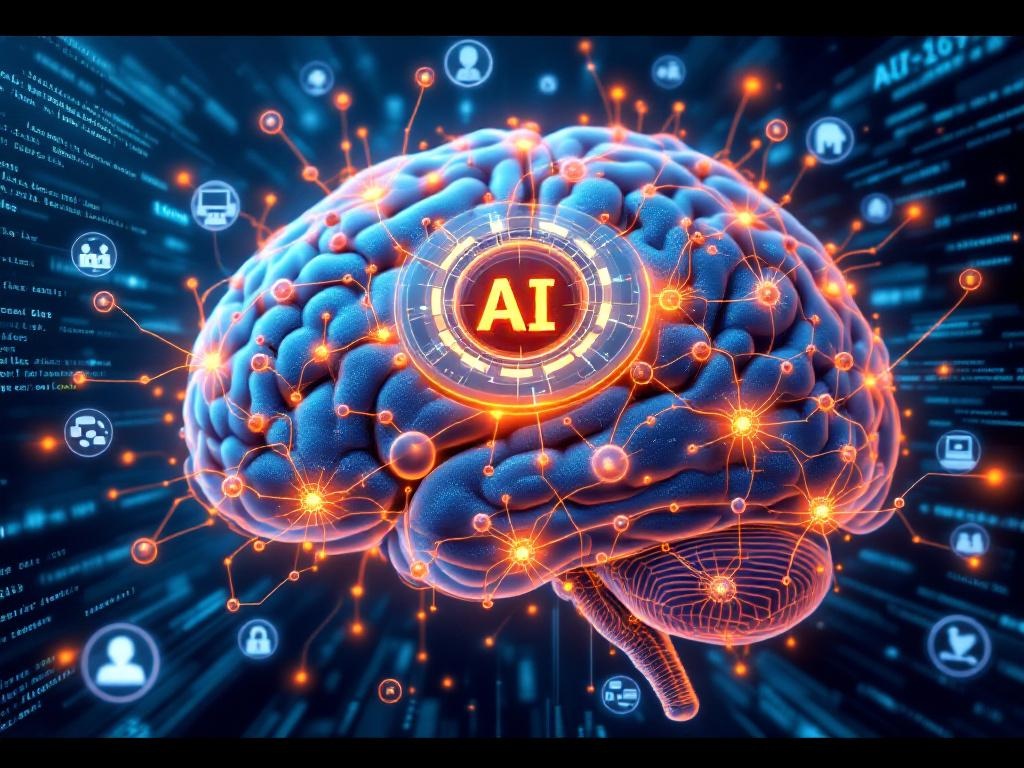In an era demanding smarter, not just bigger AI, the release of DeepCogito v2 ushers in a paradigm shift. By mastering human-level reasoning and efficient problem-solving, this open-source AI model cohort is revolutionizing the field, making it a pivotal point for technology access and innovation.
DeepCogito v2 Model Lineup: Democratizing AI Access
In the rapidly evolving landscape of artificial intelligence, the release of the DeepCogito v2 model family represents a pivotal moment in the democratization of AI technology. With its lineup consisting of four hybrid reasoning models, including two mid-sized models at 70B and 109B parameters and two large-scale mixture-of-experts (MoE) models at 405B and 671B parameters, DeepCogito v2 is making advanced AI capabilities accessible to a far broader audience than ever before. This shift is largely attributable to the strategic choice of open-source licensing, which serves as a powerful catalyst for innovation across various sectors.
The underlying philosophy of DeepCogito v2 is to achieve human-level reasoning capabilities, a feat that positions the 671B MoE model among the most powerful open-source AIs globally. This distinction is not just a matter of scale but of approach; by leveraging innovative learning techniques such as Iterated Distillation and Amplification (IDA), these models internalize their reasoning process. This enables them to anticipate outcomes with what can best be described as an AI form of intuition, sidestepping the need for lengthy and resource-intensive inference-time searches. Such efficiency gains manifest in shorter reasoning chains, approximately 60% shorter than those used by comparable systems, leading to quicker responses and substantially reduced computational demands.
Given the cost-effective training regimen of the entire Cogito v2 series—completed with less than $3.5 million—these models demonstrate that developing cutting-edge, superintelligent AI is feasible without the prohibitive expense traditionally associated with such endeavors. This achievement cannot be overstated; it proves that leading-edge AI research and development are not solely the purview of organizations with massive capital reserves. Instead, DeepCogito v2 showcases an inclusive model where academic institutions, smaller tech companies, and independent researchers can all contribute to, and benefit from, the latest advancements in AI.
The democratizing effect of DeepCogito v2’s open-source licensing is profound. It fundamentally alters the innovation landscape by removing barriers to entry and fostering a collaborative environment where advancements can be shared freely. This approach ensures that the benefits of AI, particularly those that mimic human reasoning and problem-solving capabilities, are not confined to a select few. Instead, they become a shared resource, a collective step forward in our technological evolution.
From enhancing healthcare diagnostics to refining predictive models in climate science, the applications for DeepCogito v2’s models are as varied as they are impactful. By making these tools openly available, DeepCogito v2 is not only advancing the field of artificial intelligence but is also empowering diverse sectors to tackle complex issues with unprecedented efficiency and insight. This blend of open-access philosophy and cutting-edge technology is accelerating the pace of innovation in AI, offering a glimpse into a future where AI’s full potential can be realized across society.
This democratization of advanced AI capabilities aligns seamlessly with the forward-thinking ethos of the tech community and represents a significant leap towards a world where the benefits of such technologies are accessible to all. By fostering an environment of collaboration and open access, DeepCogito v2 is paving the way for a new era of innovation, where the barriers between imagination and implementation, theory and practice, are continually eroded. In doing so, it sets a new standard for how AI development and deployment should be approached, emphasizing inclusivity, efficiency, and broad-based participation.
Human-Level Reasoning via Iterated Distillation and Amplification
In the rapidly evolving landscape of artificial intelligence, the introduction of Iterated Distillation and Amplification (IDA) by the DeepCogito v2 AI models marks a significant pivot towards achieving human-like reasoning without the extensive computational overhead typically associated with advanced AI systems. This innovative technique is central to the family’s ability to handle complex problem-solving by internalizing its own reasoning processes, thus streamlining decision-making and enhancing efficiency. The essence of IDA as employed in Cogito v2 models represents a leap towards intuitive AI problem-solving, departing from the conventional compute-heavy approaches that have dominated the field.
The fundamental principle of IDA revolves around an iterative process where a system’s output is continually refined and distilled back into its core parameters, enriching the model’s “intuition” or capability to anticipate outcomes correctly without a need for exhaustive search procedures. This methodology effectively simulates human reasoning by emphasizing learning through the reflection on and improvement of its processes. By incorporating IDA, DeepCogito v2 models, notably the larger 671B mixture-of-experts (MoE) variant, harness the power to execute reasoning chains that are approximately 60% shorter than those utilized by comparable AI, asserting an unprecedented level of efficiency in AI thought emulation.
The advantages of internalizing reasoning processes via IDA are manifold. Firstly, it leads to significantly faster response times, a critical attribute in scenarios where decision speed is paramount. Secondly, enhanced decision accuracy is achieved as the model becomes adept at predicting and navigating through complex scenarios based on a robust internalized understanding of its tasks. Additionally, this approach markedly reduces computational costs, not only making the models more sustainable but also proving that the frontier of cutting-edge AI can be pushed forward without prohibitive financial investments—the entire Cogito v2 series was trained for under $3.5 million. This cost-effective training is particularly notable considering the vast parameter count and the sophisticated capabilities of these models.
Another critical aspect of leveraging IDA in DeepCogito v2 models is its impact on the democratization of AI development. By embarking on a pathway that significantly lowers both the monetary and computational barriers to high-level AI functionalities, DeepCogito v2 ensures broad access to technologies that facilitate human-level reasoning. This open-source philosophy not only fosters innovation across diverse sectors, from academia to industry, but also aligns with a broader societal imperative for equitable access to transformative technologies.
The implications of integrating IDA into AI development extend well beyond immediate efficiency gains and reduced costs. This approach suggests a broader shift in the paradigm of AI research and development towards systems that better mimic human cognitive processes. By refining AI models to process and internalize reasoning in more humanlike ways, DeepCogito v2 sets the stage for applications that require nuanced understanding and adaptability, from natural language processing to autonomous decision-making systems. Such capabilities hint at a future where AI can more reliably assist, augment, or even independently manage complex problem-solving tasks that currently challenge even the most advanced programmatic solutions.
In conclusion, the application of Iterated Distillation and Amplification in the DeepCogito v2 AI models represents a significant stride toward intuitive, human-level AI reasoning. By internalizing its own reasoning processes, Cogito v2 efficiently bridges the gap between brute-force computation and genuine cognitive intuition, heralding a new era of AI that is both more accessible and aligned with human thinking paradigms. The subsequent exploration of large-scale Mixture-of-Experts models will further illustrate how such innovative methodologies are concretely advancing the field, pushing the boundaries of what AI can achieve in efficient problem solving.
Efficient Problem Solving: The Role of MoE Models
The DeepCogito v2 AI models have introduced an unprecedented shift in the landscape of artificial intelligence with their large-scale Mixture-of-Experts (MoE) models, namely the 405B and 671B parameter powerhouses. Standing at the forefront of AI research and development, these MoE models are pivotal in achieving human-level reasoning capabilities and efficient problem-solving within complex scenarios. Their impact is twofold, enhancing both the effectiveness and the sustainability of AI operations, thereby democratizing advanced AI development through open-source innovation.
The MoE architecture represents a breakthrough by employing a sparse activation approach. Unlike traditional deep learning models that process all parameters across every layer uniformly, MoE models activate only a subset of ‘experts’ for any given input. This strategic allocation of computational resources allows DeepCogito v2 to tackle tasks with unparalleled efficiency. The selective engagement of experts based on the task at hand means that the models can direct their computational power where it is most needed, thereby reducing overall computational costs without compromising performance.
This innovative approach directly addresses one of the most challenging aspects of AI development: the trade-off between model complexity and computational efficiency. By leveraging sparse activation, DeepCogito’s MoE models manage to sidestep this hurdle, enabling the deployment of highly sophisticated AI capabilities even in environments where computational resources are limited. This not only makes high-performance AI more accessible but also more sustainable, as it reduces the energy consumption associated with running complex AI models.
The role of MoE models within the DeepCogito v2 series cannot be overstated when it comes to efficiency gains. Through the advanced use of Iterated Distillation and Amplification (IDA), these models internalize and amplify their problem-solving capabilities. However, unlike conventional models that might require longer inference-time searches to arrive at solutions, the MoE models in DeepCogito v2 achieve equivalent or superior outcomes with significantly shorter reasoning chains. The combination of IDA with MoE’s sparse activation means that DeepCogito v2 can arrive at conclusions faster and with fewer computational resources, marking a significant leap towards more intuitive AI problem-solving that mimics human thought processes more closely.
The open-source release of these MoE models underlines DeepCogito’s commitment to broadening access to cutting-edge AI technologies. By democratizing these advanced models, DeepCogito v2 encourages widespread experimentation and innovation across various domains. Researchers, developers, and industries worldwide now have the tools to explore human-level AI reasoning without the prohibitive costs typically associated with such advanced technologies. This open accessibility is poised to accelerate advancements in AI, fostering new solutions to longstanding problems across healthcare, finance, environmental science, and more.
Moreover, the economic considerations of employing such large-scale models for AI research and application development are profoundly impacted by the sparse activation strategy of MoE models. The efficiency gains, coupled with the reduced computational costs, highlight a sustainable path forward for AI development that does not necessitate large-scale investment in hardware infrastructures. Instead, MoE models offer a blueprint for achieving top-tier AI performance in a more cost-effective and environmentally friendly manner.
In essence, the MoE models within the DeepCogito v2 series signify a pivotal advancement towards achieving AI that not only mirrors human reasoning more closely but does so in a manner that is both ecologically and economically sustainable. Through the strategic leveraging of sparse activation, these models stand as a testament to the possible future of AI, where high level problem-solving capabilities are accessible to all, fostering a wave of innovation and discovery across the globe.
Cost-Effective AI Training: A Blueprint for the Future
In the realm of pioneering artificial intelligence, the journey of DeepCogito v2 stands as a testament to achieving superlative AI capabilities on a budget that shatters the long-held belief that state-of-the-art AI development is synonymous with exorbitant costs. The saga of Cogito v2 in crafting human-level reasoning models, encompassing the efficient problem-solving AI through methods such as Iterated Distillation and Amplification (IDA), pivots on an innovative, cost-effective training methodology. This groundbreaking approach significantly democratizes the pathway to developing sophisticated AI systems.
At the heart of DeepCogito v2’s groundbreaking cost-efficiency is a multi-pronged strategy that leverages the latest in AI training efficiencies. The first component in this strategy is the innovative learning approach of IDA. By refining the AI’s ability to predict and reason through iterative cycles, Cogito v2 reduces the need for extensive and repetitive training datasets. This not only shortens the path to achieving high-quality reasoning capabilities but also slashes storage and processing demands, directly translating into lower training costs.
The utilization of hybrid reasoning models, including the two mid-sized models (70B and 109B parameters) and the two more extensive MoE models (405B and 671B parameters), facilitates a nuanced training regimen. By strategically deploying these models for different stages and types of learning tasks, DeepCogito leverages the strengths of each model type, optimizing computational resources. This approach ensures that either model type is not burdened with tasks it cannot complete efficiently, promoting a more cost-effective use of processing power and data.
Another cornerstone of the DeepCogito v2 initiative is its adeptness at scalable and distributed training. By harnessing the power of cloud-based architectures and parallel processing, the training process is accelerated, yet remains surprisingly affordable. The distributed nature of this approach allows for the cost of training to be spread over several nodes, effectively managing the overall expenditure without crippling the computational prowess required for developing AI of such sophistication.
Moreover, the Cogito v2’s exceptional ability to achieve equivalent or better performance while using about 60% shorter reasoning chains than comparable systems stands as a hallmark of efficiency. This capability is not merely an academic achievement but a critical economic advantage. Shorter reasoning chains mean quicker answers and reduced demands on computational resources, directly contributing to the cost-effective nature of the model’s training process.
Prefaced by a notable characteristic of requiring less than $3.5 million for the combined training of its model lineup, DeepCogito v2 exemplifies how innovative methodologies and strategic resource allocation are reshaping the landscape of AI development. This prudent budget management underlines a significant leap towards democratizing AI, ensuring that the pinnacle of AI innovation is not exclusively the domain of entities with vast financial resources.
In the fabric of DeepCogito v2’s development story, the strands of innovation, efficiency, and economic sensibility are interwoven to create a blueprint for the future of AI research and development. As this chapter transitions into exploring the open-source impact of Cogito v2, it is crucial to appreciate how the cost-effective training methodology not only fosters advanced technological creation but also establishes a fertile ground for nurturing industry and academic growth. The philosophy behind DeepCogito v2, thus, transcends mere technical achievements, embodying a vision for a more inclusive, collaborative, and innovative future in AI.
The Open-Source Impact: Nurturing Industry and Academic Growth
The unprecedented release of DeepCogito v2’s AI models under an open-source license is a monumental step towards democratizing AI technology. By offering four hybrid reasoning models, including the notably sophisticated 671B parameter MoE model, DeepCogito v2 sets new standards for AI capabilities accessible to a broader audience. This initiative does not simply make high-caliber AI tools available; it catalyzes a paradigm shift in how industry professionals and academic researchers approach problem-solving and innovation.
In the realm of academia, the open-source nature of DeepCogito v2 fosters an environment ripe for educational advancement and research breakthroughs. Students and scholars previously hindered by access to top-tier AI models can now engage directly with state-of-the-art technology. This access accelerates learning, promotes a deeper understanding of AI complexities, and empowers the next generation of AI practitioners with hands-on experience in advanced AI systems. Moreover, researchers can build upon DeepCogito v2, pushing the boundaries of human-level reasoning AI without the constraints of proprietary models, thus accelerating the pace of meaningful discoveries and contributions to the field.
The impact on industry is equally transformative. Small and medium enterprises (SMEs), which once faced significant barriers in adopting advanced AI technologies due to cost and accessibility, now have at their disposal tools that rival those used by tech giants. This democratization levels the playing field, allowing SMEs to innovate and compete more effectively. Companies can integrate human-level reasoning capabilities into their operations, enhancing efficiency, decision-making, and problem-solving without the prohibitive expense of developing or licensing proprietary AI models. Consequently, DeepCogito v2 ignites a surge of innovation across various sectors, from finance and healthcare to education and transportation, revolutionizing how businesses operate and deliver services.
The collaborative opportunities presented by DeepCogito v2’s open-source models are profound. By sharing advancements and improvements made on the base models, developers and researchers contribute to a communal pool of knowledge that benefits all users. This collective enhancement approach not only accelerates the evolution of AI technologies but also fosters a culture of collaboration that transcends geographical and institutional boundaries. Such synergy is pivotal in tackling global challenges, as it enables a concerted effort that combines diverse perspectives and expertise toward common goals.
Equally important is the role of DeepCogito v2 in promoting equality in the AI field. By providing access to cutting-edge AI models, it addresses the digital divide, ensuring that entities from underrepresented regions or with limited resources can participate in AI development and application. This inclusivity feeds into the broader objective of ensuring that the benefits of AI advancements are globally distributed, contributing to societal advancement and economic growth in an equitable manner.
In light of the groundbreaking leap made by the DeepCogito v2 series in terms of cost-efficient training—as discussed in the previous chapter—its open-source deployment amplifies the impact of this efficiency. Entities can now leverage these human-level reasoning models without the substantial investment previously deemed necessary, reinforcing the notion that state-of-the-art AI is no longer the exclusive domain of tech behemoths with deep pockets.
In summary, the open-source release of DeepCogito v2 is a catalyst for a new era of innovation, collaboration, and equality in the AI domain. By making its sophisticated AI models freely available, DeepCogito v2 not only advances the technological capabilities of individuals and organizations worldwide but also embodies the ethos of open science, where shared knowledge propels collective progress toward a smarter, more equitable future.
Conclusions
DeepCogito v2 is a testament to the strides made in AI, achieving human-like reasoning while making such advancements open to all. This ushers in an era of AI where intuitive problem-solving and cost-efficient development are no longer a monopoly, thus enriching global innovation landscapes.



